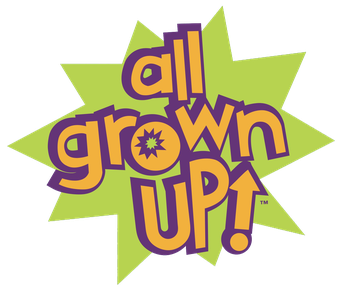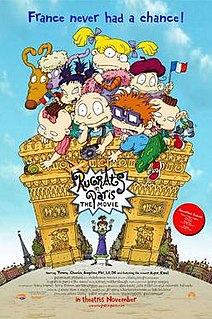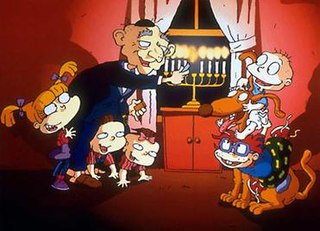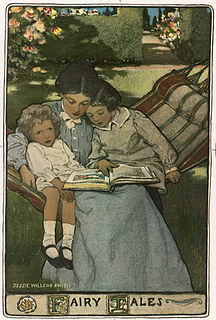
Rugrats is an American animated children's television series created by Arlene Klasky, Gábor Csupó, and Paul Germain for Nickelodeon. The show focuses on a group of toddlers, most prominently Tommy, Chuckie, twins Phil and Lil, and Angelica, and their day-to-day lives, usually involving life experiences that become much greater adventures in the imaginations of the main characters.

All Grown Up! is an American animated television series that aired on Nickelodeon from 2003 until 2008. Created by Arlene Klasky and Gábor Csupó, the series is a continuation of their popular children's show Rugrats, the series explores the daily lives of Tommy Pickles and his childhood friends, now adolescents. The concept for the series was based on the episode "All Growed Up," which served as the series' 10th anniversary special and proved successful with audiences. The series ran from April 12, 2003 to August 12, 2008, for a total of five seasons, and featured voice actors from the original series.

Rugrats Go Wild is a 2003 American animated comedy crossover film based on the Nickelodeon animated television series Rugrats and The Wild Thornberrys. It is the third and final film in the Rugrats trilogy, as well as the second in The Wild Thornberrys series. Christine Cavanaugh, the voice of Chuckie Finster, was replaced by Nancy Cartwright. The film was produced by Nickelodeon Movies and Klasky Csupo and released in theaters on June 13, 2003, by Paramount Pictures. With a worldwide gross of $55.4 million, it is the lowest grossing of the three Rugrats films.

The Rugrats Movie is a 1998 American animated comedy film based on the Nickelodeon animated television series Rugrats. It was directed by Igor Kovalyov and Norton Virgien and written by David N. Weiss & J. David Stem. The film introduced Tommy Pickles' baby brother Dil Pickles, who appeared on the original series the next year. The film features the voices of E. G. Daily, Tara Strong, Christine Cavanaugh, Kath Soucie, Cheryl Chase, Cree Summer, and Charlie Adler, along with guest stars David Spade, Whoopi Goldberg, Margaret Cho, Busta Rhymes, and Tim Curry. The events of the film take place before the sixth season of Rugrats.

Rugrats in Paris: The Movie is a 2000 American animated film based on the Nickelodeon animated television series Rugrats. It is the sequel to 1998's The Rugrats Movie and the second film in the Rugrats film series. This film marks the first appearance of new Rugrats character, Kimi Watanabe, and her mother, Kira. Also the film marks the only appearance of two villains in the Rugrats franchise, Coco LaBouche, a cruel woman who hates children, including babies, and her accomplice, Jean-Claude. The events of the film take place before the seventh season of Rugrats.

All Growed Up is a special episode of Rugrats that aired on July 21, 2001 during the show's 8th season to celebrate the series' 10th anniversary, and acts as the pilot episode of All Grown Up! Its premise was to focus on what the babies' lives would be like if they were 10 years older. It proved to be popular enough for a spinoff based on it to be made.

Rugrats: Scavenger Hunt is an interactive board video game developed by Realtime Associates for the Nintendo 64. It was originally shown at THQ's booth in 1999 and was published that same year. The game is based on the animated television series Rugrats which aired on Nickelodeon from 1991 until 2004. It features the original voices from the Rugrats cast and borrows its concept from Nintendo's Mario Party franchise.

Rugrats Royal Ransom is an action-adventure game developed by Avalanche Software and published by THQ for the PlayStation 2 and GameCube. The game was released on November 26, 2002, and is based on the Rugrats television series, which aired from 1991 to 2004 on Nickelodeon. The game's plot is loosely based on Rugrats: Castle Capers.
John Holmquist is an American television animation director. He has worked on several episodes of Rugrats as a director and storyboard artist from the late 1990s to early 2000s. Holmquist has also acted as a director for some episodes of Family Guy.

"A Rugrats Passover" is the 26th and final episode of the third season of the American animated television series Rugrats, and its 65th episode overall. It was broadcast originally on April 13, 1995, on the cable network Nickelodeon. The plot follows series regulars Grandpa Boris and the babies as they become trapped in the attic on Passover; to pass the time, Boris tells the Jewish story of the Exodus. During the episode the babies themselves reenact the story, with young Tommy portraying Moses, while his cousin Angelica represents the Pharaoh of Egypt.

"A Rugrats Chanukah", titled onscreen as simply "Chanukah" and sometimes called the "Rugrats Chanukah Special", is a special episode of Nickelodeon's animated television series Rugrats. The first episode of the show's fourth season and the sixty-sixth overall, it tells the story of the Jewish holiday Chanukah through the eyes of the Rugrats, who imagine themselves as the main characters. Meanwhile, Grandpa Boris and his long-time rival, Shlomo, feud over who will play the lead in the local synagogue's Chanukah play. Since most American children's television programs have Christmas specials, this is the first Chanukah episode of a children's television series.

"At the Movies" is the first half of the third episode of the animated television series Rugrats. It originally aired on the television network Nickelodeon on August 25, 1991, during the series' first season. In the episode, Didi and Stu take The Rugrats to a movie theatre to see The Dummi Bears and the Land Without Smiles, but Tommy is infatuated with seeing a monster movie, Reptar!. He and the babies sneak out of the theater room to catch a showing of Reptar! while leaving a wake of accidental mayhem and destruction as they do.
"Runaway Reptar" is the 113/114 TV movie episodes of the animated television series Rugrats. It originally aired on the television network Nickelodeon on November 27, 1999, during the series' sixth season. The plot follows the babies watching a Reptar movie and getting sucked into it.
The animated television series Rugrats has been noted for its portrayal of Judaism, a dynamic rarely portrayed in American animated programming during the series' broadcast run (1991–2004). Two episodes of the series are devoted to Jewish holidays and explaining their history, and the Pickles family is shown to be part-Jewish.

Rugrats: I Gotta Go Party is a 2002 game based on the Rugrats series developed by Eurocom Entertainment Software and published by THQ. It was also released on a Triple Pack cartridge bundled with Tak and the Power of Juju and SpongeBob SquarePants: SuperSponge in 2005.
The Rugrats film series is a series of animated musical comedy-drama adventure films based on the popular Nickelodeon animated series, Rugrats, created by Arlene Klasky, Gábor Csupó, and Paul Germain. The first three films were released in 1998, 2000, and 2003 with a fourth one set for release in 2021. The three films received mostly mixed reviews from film reviewers, but were all commercial successes, collectively grossing nearly $300 million worldwide.
"Mother's Day", also known as the "Rugrats Mother's Day Special" or "Rugrats Mother's Day", is the second episode of the fourth season of the American animated television series Rugrats and the show's 67th episode overall. Released as a Mother's Day special, it revolves around the holiday from the perspective of a group of babies—Tommy Pickles, Chuckie Finster, and Phil and Lil Deville. Tommy, Phil, and Lil attempt to find the perfect mother for Chuckie while sharing their favorite memories about their moms. At the end of the episode, Chuckie's mother is revealed to have died of a terminal illness. It concludes with Chuckie and Chaz looking through a box of her belongings, including a poem she had written for her son. Meanwhile, Didi Pickles tries to plan the perfect Mother's Day with her mom Minka, while Betty DeVille helps Stu Pickles with his invention to help mothers.



















